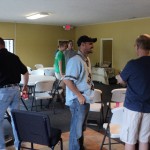The Next Step
As some of my readers know (and some may not know), when our church meets together, the teaching is a little different than the teaching (preaching?) when most churches meet. What do I mean? Well, typically, our teaching is in the form of a discussion.
Generally, we have an agreed up subject or passage of Scripture. Someone agrees to teach that subject or passage. What that means is that that person facilitates a discussion concerning the subject or passage. The amount of lecture combined with discussion/dialog depends on who is teaching / facilitating our teaching time.
Since more than one person is speaking, the teaching can get very specific. Someone may ask a specific question that affects what the person is facing in life. Another person may make a completely different comment, but just as specific and just as personal to that person or to someone else.
The last time we met as a church, we met around tables. When we do this, along with the teaching I described above, the person leading our teaching also gives us a question or topic to discuss around each table (with 6-10 people at each table). In this way, even more people take part in the teaching, and even more specific and personal questions or applications or problems or comments are considered.
This type of teaching is much more direct and more personal and (I think) more discipling than any other that I’ve ever experienced. But, there may still be something missing. Let me try to explain.
Margaret, my wife, and I were talking about the teaching and our time together. Later, we also talked with another couple who are our close friends. We all agreed that something is missing, and that’s the next step. The next step would be for the teaching to move beyond words and concepts into action.
Let me give you an example. Suppose, for instance, that we’re talking about reaching out to our neighbors, coworkers, family, etc. with the gospel. As we talk about this subject, several people may offer specific examples of opportunities that they’ve had to share the gospel with others. Others, then, would probably share that they know that they need to share the gospel (and they may even have someone specific in mind), but they struggle with doing that. We would probably encourage that person, and even pray for him or her right then.
But, what about the next step? What needs to happen next? Well, someone needs to come alongside that person and help him or her to share the gospel with the other person that God has brought to mind. And, that could happen right away.
Imagine, we’re sitting together as the church (either around tables or in a circle), and someone expresses a struggle with sharing the gospel with a neighbor. We encourage the person and pray for him or her. Then – the next step – someone offers to go with that brother or sister (perhaps at that very moment) to share the gospel with the neighbor. Or, perhaps someone else offers to take the struggling brother or sister along on a trip to the food pantry when the gospel is often shared.
There are so many possibilities, but it means taking the next step – the step away from concept and toward action.
I think this is an important step for us (and any church and all believers) to take. Why? Because discipleship (becoming more mature in Jesus Christ) is not only about concepts. Instead, it’s also about obediently following Jesus Christ throughout our lives.
Have you ever been part of a church meeting when people took the next step, and actually acted to help a brother or sister right away (it doesn’t have to be with evangelism, it could be with anything)? What do you think?
A Friend is Waiting
My friend Jason at “Second and Content” is planning to move to South Africa next spring. He hopes to stay there for a year working with orphans. Recently, he wrote a post called “Sitting, Waiting, Listening (Genesis 39-45 Redux).”
In the post, Jason talks about (very honestly and openly) how worried he’s been about everything working out for him to go to South Africa. He also talks about how the church has helped him with this issue. He says:
Hearing this conversation go on between Gary, Alan, and Rodney was like little Mark came out of nowhere and slapped me in the face and said, PAY ATTENTION! I was so consumed with thoughts I couldn’t bring myself to formulate coherent sentences for the discussion. I had had a discussion with Alan the week before because I was geting a little anxious waiting on God to do something and trying to discern to what degree do I work towards this goal without me messing it up. I’ll admit, I was pretty distraught, that happens to me occasionally, I get so worked up about something that thats the only thing I can think about, and I worry. Working through this Joseph discussion, I was once again refocused back on the goal: go to Africa. God showed me that, no matter whether I tried to make it happen, it would not happen if He didn’t make it happen. Just go on about life, don’t complain or question, just work towards the goal and it will work out the way that God has planned. I’ll keep preparing until God stops me. While at the same time, sitting, waiting patiently for the time to go, and listening for that word to stop or continue going.
Jason writes more, so you should read his post. But its great to see how God is using several of us to encourage Jason during this time of planning and waiting.
A Living Letter
Yesterday, Dave Black posted the following words (Friday, October 15, 2010 at 10:10 a.m.):
“A living epistle, read by all” (2 Cor. 3:2). I love this word picture. Paul suggests that we are to allow others to turn the pages of our lives and read the fine print. The imagery points to open and honest communication. As a rule, however, we gild the covers of our lives and conceal the contents. I think this is often true of blogging. Conversely, a blog can reveal our hidden faults. The impudent tone, the look of disdain, the judgmental or superior attitude — all these jeopardize the message, regardless of how true that message may be. On the other hand, love liberates. Everywhere in the blogosphere I see Christians who are seeking to use their words to edify others. They’re not reactionary, they’re not fussing over minor matters, they’re not pontificating, they have a philosophy of blogging that gives them a happy freedom to seek in specific and creative ways to serve others.
He then goes on to exhort all of us to “journey together back to what is of ultimate importance.”
I hope that my blog is also a “Barnabas blog” – a source of encouragement to my readers. I also hope that it is a window into my life – the good, the bad, and the ugly. I know that I am often encouraged and strengthened by the interaction here.
We may disagree from time to time, but in Christ we are family. Thank you for sharing this journey with me.
Like a Family Reunion?
Sol at “Looking for Church” has been thinking about church in his post “Update #6.” He writes:
I’ve been thinking about the church, and I’ve been trying to back it up in my mind where we only get together, period. No bible study, no time for prayer, no “worship†schedule. I picture Thanksgiving with the family. People talking over here, people laughing over there, people praying in the back. And then defining the assembly as that, just a family gathering. Can’t each one bring a teaching, a song, a prayer in this scenario? Everyone is there to edify one another.
When the church gathers together, does the meeting have to be scheduled (whether that schedule is published or by habit)? Does everyone have to do the same thing at the same time, listen to the same person/people at the same time, sing the same songs at the same time?
Or, can the church meet together as Sol describers?
What do you think?
(By the way, while you’re at Sol’s blog, don’t miss his latest post, “Despair.”)
Stand firm and do good – Polycarp
Here’s a challenging passage from Polycarp written to the church in Philippi sometime in the early second century:
Stand fast, therefore, in these things, and follow the example of the Lord, being firm and unchangeable in the faith, loving the brotherhood, and being attached to one another, joined together in the truth, exhibiting the meekness of the Lord in your intercourse with one another, and despising no one. When you can do good, defer it not, because “alms delivers from death.” Be all of you subject one to another, having your conduct blameless among the Gentiles,” that you may both receive praise for your good works, and the Lord may not be blasphemed through you. But woe to him by whom the name of the Lord is blasphemed! Teach, therefore, sobriety to all, and manifest it also in your own conduct. (Polycarp to the Philippians 10.1-3)
I think this would be good for all believers and churches to ponder.
Be Prepared
Yes, “Be Prepared” is the Boy Scout motto, or at least, it was the Boy Scout motto back when I was a scout.
But, Scripture also instructs believers to be prepared any time they meet with other believers. Prepared for what? Prepared to build up the other believers. Prepared to help them grow in maturity with Christ. Prepared to encourage them with the circumstances and situations of their life.
For the last several weeks, I’ve been sharing my “preparation” on Facebook. Hopefully, these short statements have helped others think about how they meet with the church. This is what I’ve shared so far:
I’m ready to meet with the church with a song and a pot of chili. What are you bringing to build up your family?
When we meet with the church this morning, I’m bringing a lesson from Genesis 34, and I’ve helped my son Jeremy to prepare a lesson from Genesis 33. What are you bringing to build up your family when you meet with the church?
Meeting with the church soon. I’m bringing a teaching from Genesis and sub sandwiches. What have you prepared to build up your family?
I’m bringing a song, a praise (answered prayer request), and a pot of chicken corn soup for the church today. What have you prepared to build up your brothers and sisters toward maturity in Christ?
Looking forward to my friend Jim teaching and leading our discussion on Genesis 39-41 this morning. I’m bringing some insights on that passage and meatball subs to share with the church. What are you sharing with your brothers and sisters to help them grow in maturity in Christ?
How do you prepare to meet with your brothers and sisters in Christ?
The Disconnect with Commentaries
Eric from “A Pilgrim’s Progress” shares an “Interesting Commentary on I Corinthians 14:26-33.” Eric is referring to William Barclay’s commentary on 1 Corinthians which was published in 1975. Eric includes this quote from Barclay:
There was obviously a flexibility about the order of service in the early Church. Everything was informal enough to allow any man who felt that he had a message to give to give it. It may well be that we set far too much store on dignity and order nowadays, and have become the slaves of orders of service. The really notable thing about an early Church service must have been that almost everyone came feeling that he had both the privilege and the obligation of contributing something to it. A man did not come with the sole intention of being a passive listener; he came not only to receive but to give. Obviously this had its dangers, for it is clear that in Corinth there were those who were too fond of the sound of their own voices; but nonetheless the Church must have been in those days much more the real possession of the ordinary Christian. It may well be that the Church lost something when she delegated so much to the professional ministry and left so little to the ordinary Church member. (page 134)
Eric adds some great remarks to this quote in his post. But I wanted to mention something else.
A few years ago, I wrote an exegesis paper on 1 Corinthians 14:26-40 for a seminary class. While doing research for that paper, I came across several commentaries with similar conclusions. In other words, when studying Scriptures, Barclay’s comments above seem obvious (well, perhaps not to everyone, but to most commentaries that I’ve read).
But, there’s a disconnect when it comes to practice. Very few churches actually meet the way that Barclay (and many others) conclude that the early church met.
Why do you think that disconnect exists?
Once you get ’em started
A few weeks ago, one of my fellow elders said that we need to try to get the young people (children and teenagers) more involved in our church meetings. As I wrote in a previous post (see “Equipping“), I helped my son, Jeremy, get more involved by teaching one Sunday morning.
But, we also wanted the young people to understand that they could (and should) take part in the discussion and encouragement that takes place on Sundays (and anytime they are meeting with other believers). We wanted them to recognize that as children of God who are indwelled by the Holy Spirit, it is their responsibility (as much as it is the adults’ responsibility) to build up their brothers and sisters in Christ.
So, whenever one of the children or teenagers have added something to our discussion or has requested prayer or has spoken up in other ways during our church meetings, we (individually and corporately) have attempted to notice and affirm their participation.
Last Sunday, several families were traveling, so we met with a smaller than usual group. However, there were several children and teenagers (7 between the ages of 11 and (just turned) 18). For some reason, they began to take part in our discussion of Genesis. Several of them offered some very good insights, especially as we discussed Jacob’s favoritism of Joseph. (By the way, when I was talking with them later, one of the young ladies told me that she was more comfortable because there were not as many people present.)
(Irony of ironies was that the elder who encouraged us to help the young people get involved was not meeting with us Sunday.)
Later, I was talking with a brother about Sunday and the young people getting involved in the teaching and discussion. He was very excited about it too. He asked, “What do we do if one of them starts speaking too much, or starts saying things that are not true?”
He was asking honestly. But, his question is the one that is normally raised when you begin to talk about participatory meetings. What do you do when someone speaks “out of turn” (however you want to define that). The way I see it, there are two extremes that you want to stay away from.
Extreme #1: Allow anyone to say anything that they want without any consequences at all.
Extreme #2: Don’t allow anyone to speak unless you know up front what that person is going to say and how they are going to say it.
Like I said, I think the church needs to stay away from both extremes. Instead, I think we need to allow people to speak. But, if someone becomes abusive or heretical (contrary to the gospel), then we need to counsel that person – privately at first, but if it continues, it may have to be public. (I’ve never had to move beyond the “private” admonishment.)
So, what do you think about young people (children and teenagers) speaking and teaching when the church meets? What would you do if one of them (or an adult, for that matter) speaks too much or says things that are either untrue or unhelpful?
Since we’re talking about church buildings
Since my previous post was about a church deciding to sell their building so they could help more people (see “Church Sells Building to Help More People“), I thought I would also copy this gem from Dave Black (Sunday, October 3, 2010 at 7:41 a.m.):
This morning I’ll be gathering with the Body of Christ in a building dedicated to such gatherings.
Some people call it a sanctuary — a very misleading term, as the room in which we meet is no more sacred in God’s eyes than the restroom across the hall. Many followers of Jesus will prefer to meet in a home this morning instead. They seem to understand, perhaps in a deeper way than many “church-goers,” that in the kingdom, buildings aren’t sacred. When Jesus spoke with the Samaritan woman, He declared that even places we deem most sacred don’t deserve our worship. Jesus is Lord, and He can be worshipped anywhere, anytime. His “church” is nothing more than an assembly of people who have welcomed God’s kingdom into their lives and relationships. Followers of Jesus are therefore always suspicious of man-made structures that seek to replace kingdom values. The church is not a building. The church is not an institution. The church is not a program. These are only and always human creations. They never supersede kingdom authority. Or biblical authority for that matter. None of them is sacred though they often become “sacred cows.”
But there is more. Each of these things I’ve just mentioned — buildings and institutions and programs — each of them can be, indeed ought to be, dedicated as a tool for celebrating the Good News of the kingdom. When this occurs — and I’m afraid it occurs all too infrequently — the focus is no longer on physical or institutional or programmatic objectives. We now view our meeting places as nothing more than that — mere skins of the kingdom’s ferment. They are no longer the focus. We even stop idolizing them.
So, this morning I will meet with the brethren in a structure that some sacralize and that others view merely as a wineskin. The issue is one of attitude and perspective. A “religious” building can witness to our pride or to the wine. The same is true of a home fellowship. Either structure can begin to calcify. Indeed, given enough time, they probably will calcify. Then we will have to come back to the place where we started: recognizing that no place is sacred to God except in the sense that all places are sacred to God.
What a great post! What is a building (any building, even a home)? Simply a place where the church can meet. There are no holy buildings. As long as the place is not idolized (or sacralized, to use Dave’s term) and as long as the building and maintenance is not controlling how the church uses the money that God gives them, and as long as we are able to function as the church when we meet together, then who cares where the church meets?
The question is… when we meet together… whenever… and wherever… are we helping one another to live a mature life in Jesus Christ?
Equipping
Each Sunday, our church studies through a certain passage of Scripture together. Currently we are working our way through Genesis, usually studying 1-3 chapters per week. Also, each week, someone is scheduled to facilitate our study.
Depending on who is scheduled to facilitate the study, our teaching may be more lecture-style or more discussion-style. I say “more-” because there is always discussion and dialog, even if they teacher decides to lecture. (By the way, I’m not saying this is the only way to teach. It has been very beneficial for us to do it this way.)
Last Sunday, I was scheduled to teach through Genesis 33-34. As a follower of Jesus, I have the responsibility of teaching others. And, as a teacher, I have the responsibility of equipping others to teach.
So, Sunday, I took the opportunity to do both. I asked my son Jeremy if he would be willing to teach part of Genesis 33. He agreed. So, the two of us worked on his lesson together. We read through the chapter a few times together, and we talked about it together.
Then, when he was ready to start putting together his teaching (“lesson”), I helped again by suggesting for him to think about answering two questions. He divided his lesson into two parts, with each part answering one of the two questions.
Since this was the first time he would be teaching the group, I also suggested that he write out his teaching. Often, when people first start teaching, they can become very nervous or lose their train of thought. So, by writing his lesson down, he was able to prepare what he wanted to say and then present it without being concerned about getting nervous or getting lost.
He did a great job answering the two questions. I made a few suggestions about connecting his material together. I asked if he wanted to lecture or if he wanted to ask for discussion or questions. He wanted discussion, so the two of us picked a few places in his teaching that he could stop and ask for questions or comments.
Then, I asked him to think about the two questions and answers and to think about how he would apply those to people today. He wrote out a couple of paragraphs of application.
Sunday morning, after we sang a few songs and read through some Scripture together, it was time for me to teach. I told everyone that I had asked Jeremy to help me. I reminded everyone of the background and context of Genesis 33-34 (especially the events at the end of Genesis 32), and then turned the teaching over to Jeremy.
He read through Genesis 33. Then began to read his lesson. At the appropriate time, he stopped and asked for questions or comments. He responded to those. Then, he would continue his lesson. After he finished, I continued teaching through Genesis 34.
After Jeremy finished, and before I started teaching again, someone made a comment that I’ll always remember. One of our brothers said to Jeremy, “You didn’t even have to go to seminary.” But, of course, that’s the point. If the church was training and equipping people, then seminary would not be necessary. (I’ve even hard many seminary professors make this same statement.)
So, I was excited to teach Sunday. But, even more than that, I was excited to have the opportunity to continue to equip Jeremy to teach as well.










